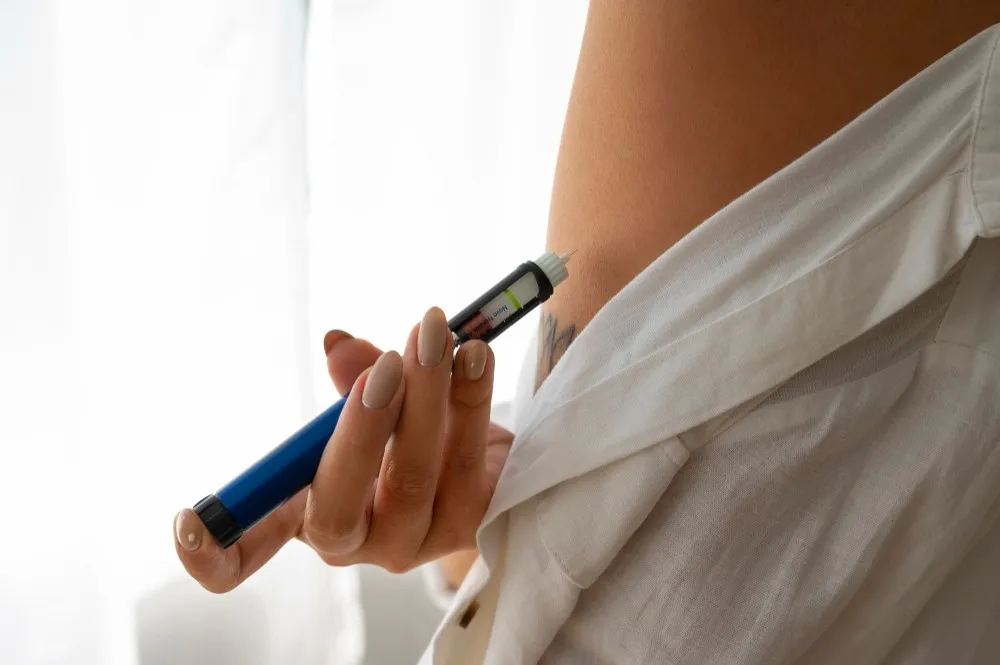What is Insulin?
Insulin is the sugar controlling hormone in human bodies, created by the beta cells at islets of Langerhans in the pancreas. The hormone is endocrinal in nature and controls blood sugar levels by acting as signals asking cells to take up blood glucose.What does Insulin do?
Insulin binds with blood glucose and facilitates their absorption in cells. The regulatory action of insulin is characterized by its inhibiting metabolic processes that take up or create glucose in the blood, to avoid conditions of excess blood glucose counts which is also known as hyperglycaemia and deficient blood glucose count, which is also known as hypoglycaemia in the body.How does Insulin work with glucose?
Insulin acts as the main controller of blood glucose levels in the human body. The hormone encourages uptake of glucose in cells and therefore, is used to control high blood glucose levels instantly.Can Insulin cure diabetes?
Diabetes is a condition that results due to metabolic dysfunction in the pancreas that fails to detect high blood glucose levels and produce insulin likewise. Insulin is externally injected in such patients to control the blood glucose levels. Insulin can be used to control diabetes, but it cannot be relied upon for a cure of diabetes.What is Insulin deficiency?
Insulin deficiency is the medical condition when the pancreas is unable to produce required amount of insulin in the human body. It leads to a condition called hyperglycaemia in which blood glucose levels go higher than estimated targets because they are not taken up by the blood vessels in the absence of insulin.What is Insulin Resistance?
Insulin resistance is a physiological condition in which cells in the human body fail to recognize the hormone insulin present in blood that signals them to take up glucose from the blood. As a result, blood glucose accumulates and this insulin resistance leads to a condition called hyperglycaemia.Types of Insulin?
There are four different types of artificially synthesized insulin that are available for diabetes treatment and therapeutics today. They are as follows:- Rapid Acting: These start action in the first fifteen minutes after injection and reach a peak after approximately an hour. They continue to work after the peak for two to four hours. They are taken before meal and/or in addition to existing dose of long-acting insulin.
- Short Acting: These types start working approximately after 30 minutes post-injection and reach a peak at around 2 to 3 hours. The insulin continues to work after attaining peak activity for three to six hours. The insulin is given before a meal and often as an addition to existing dose of long-acting insulin.
- Intermediate Acting: This type of insulin is cost-efficient since it starts working around 2 to 4 hours post-injection and reaches a peak around 4 to 12 hours later. The intermediate acting insulin stays active after reaching peak activity for around 12-18 hours. This is prescribed twice a day and sometimes in addition to short- or rapid-acting insulin doses.
- Long Acting: This begins to work after several hours post-injection and can work for around 24 hours. Rapid- or short-acting insulin doses are often prescribed along with long acting insulin doses.
Difference between body insulin and insulin that is taken?
Body insulin is synthesized within the human body and unless there is a case of insulin resistance, the signals sent out by the insulin easily triggers or inhibits insulin uptake in the cells. Insulin that has been created in labs and synthesized keeping in mind rapid, short or long activity are often initially rejected by the recipient body and may lead to hyperglycaemic or hypersensitive reactions for a while. However, the most important advantage of synthesized insulin is the activity graph of each type of insulin, which helps to control blood glucose levels as required.How often do we need to take insulin?
Dosage directions differ from patient to patient. While people with mild diabetes (type 2) may need only one shot in a day, people with acute diabetes (type 1 or 2) may need five to six shots in a day with a combination of long acting and short, rapid or intermediate acting insulin doses.Can Insulin be taken orally?
There are no oral doses of insulin because the hormone binds directly with blood glucose. Insulin can be given by a syringe, injection pen, or an insulin pump that delivers a continuous flow of insulin.Where on the body is Insulin injected?
Insulin is injected intravenously in expose-able body parts like arms, wrists, thighs, waist or back.Side effects of taking Insulin?
There are many known side effects of taking insulin which is usually caused by introduction of synthesized insulin in the body. The side effects are as follows:- Rashes or allergy
- Redness and soreness of skin
- Frequent urination
- High blood sugar levels
- Blurred vision
- Giddiness
- Fainting
Storage of Insulin?
The best way to store insulin is to keep in refrigerators at sub-zero temperatures. This way the hormone is stored for a long duration. Cold storage in refrigerators is also advised for large stocks of insulin. Too long storage in deep freezer compartments may lead to denaturation and therefore, cold storage should be alternated between deep freezers and normal freezers.List of the best diabetes doctor in India
Delhi NCR | Mumbai Region | Kolkata | Hyderabad |

Reviewed by







